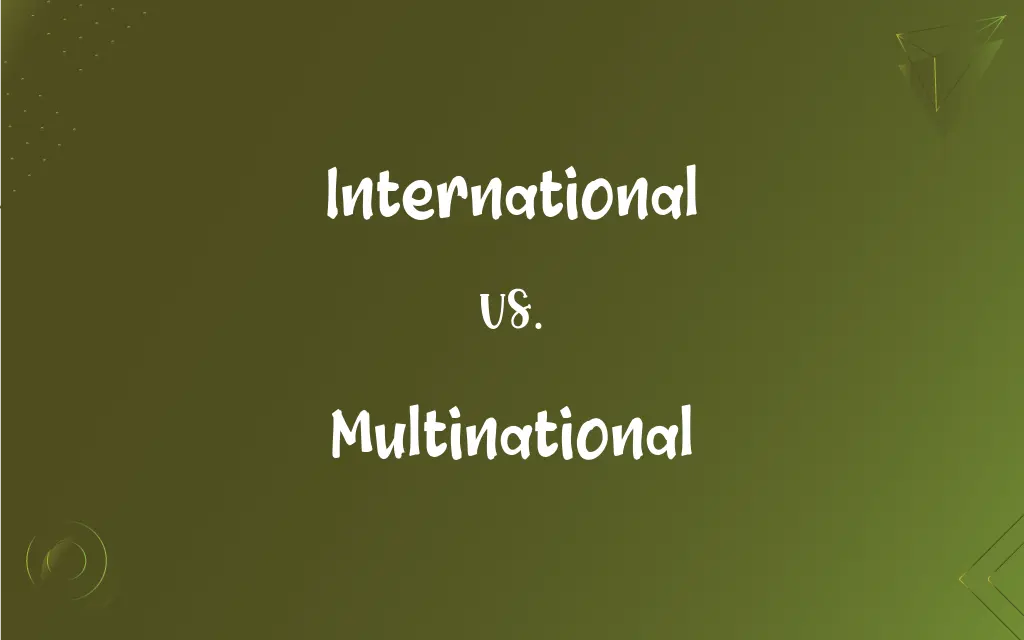International vs. Multinational: What's the Difference?
Edited by Aimie Carlson || By Harlon Moss || Updated on October 2, 2023
International relates to or involves two or more countries. Multinational refers to corporations or people that operate in or span multiple countries.

Key Differences
International typically implies something that involves or extends across several nations. For instance, an international conference would involve participants from various countries worldwide, highlighting the idea of global cooperation and exchange. Conversely, multinational implies the existence or operations spread across many nations, like a corporation with branches in numerous countries, indicating a more physical and functional presence in those locations.
In international relations, the focus is generally on policies, treaties, or agreements between two or more nations, and this can involve a wide variety of aspects such as trade, security, and diplomacy. However, in a multinational context, the emphasis often shifts towards how a single entity (often a corporation) functions, operates, and adapts to various countries where it has established its presence, implying a strategical and operational angle.
International can also relate to the understanding, appreciation, and incorporation of various cultures and practices, often symbolizing a broader, more encompassing viewpoint. On the flip side, multinational usually implies dealing with the different legal, social, and economic environments of the various nations in which an entity operates, necessitating a more nuanced and adaptable approach.
When dealing with international law, we delve into regulations and agreements that are recognized and upheld by multiple nations, showcasing a collective approach towards common norms, ethics, and policies. Meanwhile, a multinational corporation needs to navigate, respect, and adhere to the varied legal frameworks of all the countries it operates in, indicating a much compartmentalized and localized understanding of law and practices.
Comparison Chart
Definition
Involves or relates to multiple countries.
Operates or has presence in multiple countries.
ADVERTISEMENT
Grammatical Use
Adjective describing something involving nations.
Adjective describing entities operating in several nations.
Common Use Case
International treaty/agreement.
Multinational corporation/company.
Focus in Use
Usually emphasizes cooperation or relation.
Emphasizes operational presence in nations.
Association
Often associated with policies and relations.
Typically associated with businesses.
International and Multinational Definitions
International
Involving two or more countries.
The international summit hosted leaders from around the world.
ADVERTISEMENT
Multinational
Operating in several countries.
The multinational company has offices in 30 countries.
International
Applicable worldwide.
English is often used as an international language.
Multinational
Belonging to or involving citizens of several countries.
The multinational force aimed to bring peace to the region.
International
Active or available globally.
The international airport facilitates global travel.
Multinational
Comprising people from several countries.
The multinational crew worked harmoniously together.
International
Pertaining to global relations.
International studies involve understanding global politics.
Multinational
Having investments or production in various countries.
The multinational corporation outsourced its manufacturing to several Asian countries.
International
Existing between nations.
International laws are applicable to all signatory countries.
Multinational
Involving or engaging with numerous nations.
A multinational alliance was formed to address climate change.
International
Of, relating to, or involving two or more nations
An international commission.
International affairs.
Multinational
Having operations, subsidiaries, or investments in more than two countries
A multinational corporation.
International
Extending across or transcending national boundaries
International fame.
Multinational
Of or involving more than two countries
A multinational research project.
International
Any of several socialist organizations of international scope formed during the late 1800s and early 1900s.
Multinational
A company or corporation operating in more than two countries.
International
Of or having to do with more than one nation.
Multinational
Of, or involving more than two nations (externally between countries or internally in a country).
Multinational
(of a business organization) Operating, or having subsidiary companies in multiple countries (especially more than two).
Multinational
A multinational company.
Multinational
Involving or operating in several nations or nationalities;
Multinational corporations
Transnational terrorist networks
FAQs
Can a small company be considered international?
Yes, a small company can be considered international if it has business dealings, partners, or a market in multiple countries.
What does international mean?
International refers to anything that involves, is related to, or operates across two or more countries.
How is multinational different from international?
While both pertain to multiple countries, international typically refers to cooperation or relations between nations, whereas multinational usually describes entities or efforts that operate in multiple countries.
Can a person be described as multinational?
It's less common to describe a person as multinational, but it might be used if they have substantial ties, like citizenship or business interests, in multiple countries.
Can "international" refer to companies?
Yes, it can, but it often emphasizes global cooperation or presence rather than operational facets in multiple countries which "multinational" implies.
Is every multinational entity also international?
While all multinational entities have an international aspect due to their multi-country operations, not all international entities or activities are multinational.
What is an example of international cooperation?
International cooperation can be exemplified by multiple countries working together to address global challenges, such as climate change, through agreements like the Paris Agreement.
How do multinational companies affect local economies?
Multinational companies can impact local economies in various ways, including creating jobs, affecting local industries through competition, and contributing to tax revenues, among others.
Can a person be described as international?
A person might be described as international if they have significant connections, experiences, or activities involving multiple countries.
Is international law binding for all countries?
International law is generally binding for countries that have agreed to it through treaties or are members of international organizations, though enforcement can be a complex issue.
Can a non-profit organization be international?
Yes, non-profit organizations can be international if they operate, coordinate activities, or have an impact across multiple countries.
Can a non-profit organization be multinational?
A non-profit organization could be considered multinational if it has significant operations and presence in multiple countries, though this term is commonly associated with corporations.
How do international treaties get formed?
International treaties are typically formed through negotiations between countries, often involving diplomats, leaders, and experts, and are finalized when agreed upon and signed by the involved nations.
What are international relations?
International relations involve the interactions, agreements, and dynamics between different countries and are often related to diplomacy, trade, and global issues.
How do multinational companies handle varying business regulations?
Multinational companies navigate through different business regulations by adhering to local laws and guidelines in each country they operate in, often having localized strategies and approaches.
Can a small company be considered multinational?
Generally, small companies are not labeled as multinational unless they have substantial operations, such as offices or factories, in multiple countries.
Do multinational corporations pay taxes in every country they operate in?
Multinational corporations are generally required to pay taxes in each country they operate in, though the specifics can depend on local tax laws and international tax agreements.
What's an example of an international entity?
The United Nations (UN) is a prime example of an international entity, involving member countries from around the world to address global issues.
What’s an example of a multinational entity?
A well-known example of a multinational entity would be McDonald's, as it has operations, including restaurants and franchises, in numerous countries worldwide.
How do multinational companies manage cultural differences?
Multinational companies manage cultural differences by often adopting a global mindset, ensuring cultural sensitivity, and sometimes localizing their approach to products, marketing, and management in various countries.
About Author
Written by
Harlon MossHarlon is a seasoned quality moderator and accomplished content writer for Difference Wiki. An alumnus of the prestigious University of California, he earned his degree in Computer Science. Leveraging his academic background, Harlon brings a meticulous and informed perspective to his work, ensuring content accuracy and excellence.
Edited by
Aimie CarlsonAimie Carlson, holding a master's degree in English literature, is a fervent English language enthusiast. She lends her writing talents to Difference Wiki, a prominent website that specializes in comparisons, offering readers insightful analyses that both captivate and inform.































































